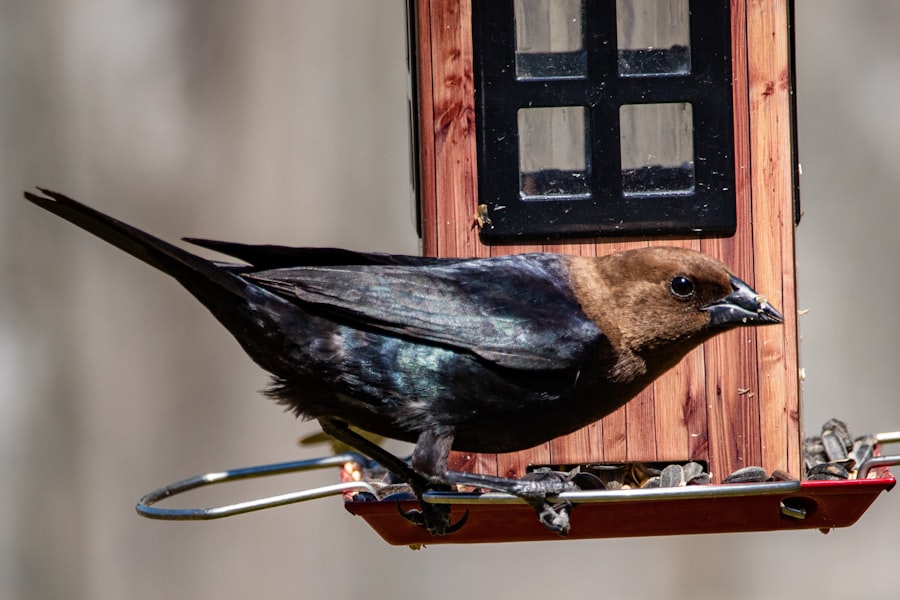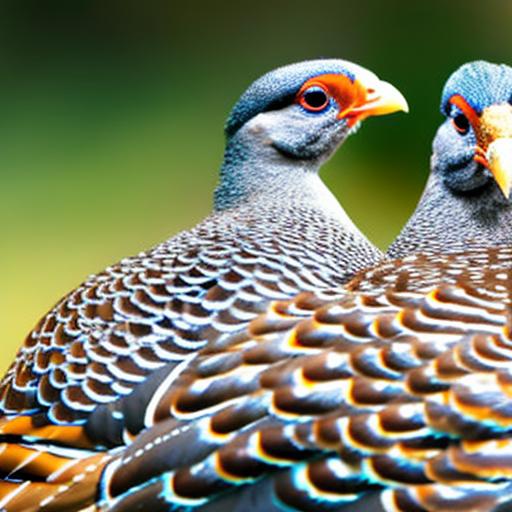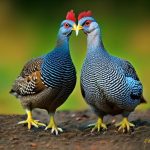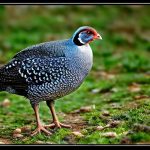Guinea fowl, also known as guineas, are a unique and fascinating bird species that have been domesticated for thousands of years. They are native to the African continent and are closely related to other game birds such as pheasants and turkeys. Guinea fowl are known for their distinctive appearance, with speckled feathers and a helmet-like bony structure on their heads. They are also prized for their insect-eating abilities and are often kept on farms and homesteads to help control pests such as ticks and grasshoppers.
Guinea fowl are social birds that thrive in small flocks, and they are known for their loud and distinctive calls. They are highly adaptable and can thrive in a variety of climates, making them a popular choice for poultry enthusiasts around the world. While they are primarily kept for their pest control abilities and as a source of meat and eggs, guinea fowl can also make interesting and entertaining pets for those willing to put in the time and effort to care for them properly.
Key Takeaways
- Guinea fowl are unique and interesting birds that are known for their loud calls and colorful feathers.
- They are highly social and prefer to live in flocks, making them great foragers and effective pest controllers.
- Pros of keeping guinea fowl as pets include their low maintenance, pest control abilities, and their entertaining and watchful nature.
- Cons of keeping guinea fowl as pets include their loud calls, flighty behavior, and their tendency to roam and explore.
- Guinea fowl require a secure and spacious coop with access to outdoor space, as well as a balanced diet and regular health check-ups to thrive as pets.
Characteristics and Behavior of Guinea Fowl
Guinea fowl are known for their unique and quirky behavior, which can make them both entertaining and challenging pets. They are highly social birds that thrive in small flocks, and they have a strong pecking order within their group. This means that introducing new guinea fowl to an existing flock can be a delicate process, as the established birds may be territorial and aggressive towards newcomers.
Guinea fowl are also known for their loud and distinctive calls, which can be quite startling to those unfamiliar with the species. They are highly vocal birds, and their calls serve as a form of communication within the flock. While this can be charming to some, it can be off-putting to others, especially those with close neighbors. Additionally, guinea fowl are known for their skittish nature and can be easily spooked by sudden movements or loud noises. This can make them challenging to handle and train, especially for inexperienced bird owners.
Pros and Cons of Keeping Guinea Fowl as Pets
There are several pros and cons to consider when deciding whether or not to keep guinea fowl as pets. On the positive side, guinea fowl are excellent pest controllers and can help keep your property free of ticks, grasshoppers, and other unwanted insects. They are also relatively low-maintenance birds, requiring minimal grooming and care compared to other poultry species. Additionally, guinea fowl are hardy and adaptable birds that can thrive in a variety of climates, making them a good choice for homesteaders and small-scale farmers.
However, there are also some drawbacks to keeping guinea fowl as pets. Their loud and distinctive calls can be off-putting to some people, especially those with close neighbors or in urban environments. Additionally, guinea fowl can be challenging to handle and train, especially for inexperienced bird owners. They are skittish by nature and can be difficult to confine, making them prone to wandering off or becoming prey to predators. Finally, guinea fowl have a strong flock mentality and may not bond closely with humans in the same way that other poultry species do, making them less suitable as pets for those seeking companionship from their birds.
Housing and Care Requirements for Guinea Fowl
When keeping guinea fowl as pets, it is important to provide them with appropriate housing and care to ensure their health and well-being. Guinea fowl require a secure coop or shelter to protect them from predators and the elements. The coop should have plenty of ventilation and natural light, as well as roosting bars for the birds to perch on at night. It is also important to provide a secure outdoor run or enclosure for the guinea fowl to roam in during the day, as they are prone to wandering off if left unsupervised.
In terms of care, guinea fowl require a balanced diet that includes a high-quality poultry feed supplemented with fresh fruits, vegetables, and insects. They also need access to clean water at all times, as well as regular dust baths to help keep their feathers clean and free of parasites. Additionally, guinea fowl should be provided with regular veterinary care to monitor their health and address any potential issues such as parasites or respiratory infections.
Training and Socialization of Guinea Fowl
Training and socializing guinea fowl can be a challenging but rewarding process for pet owners. Guinea fowl are naturally skittish birds that can be difficult to handle and train, especially for inexperienced bird owners. However, with patience and consistency, it is possible to build trust with guinea fowl and teach them to tolerate handling and confinement.
One effective method for training guinea fowl is positive reinforcement, using treats or rewards to encourage desired behaviors such as returning to the coop at night or coming when called. It is important to start training guinea fowl from a young age, as older birds may be more set in their ways and resistant to change. Additionally, providing plenty of space for the guinea fowl to roam and explore can help reduce stress and encourage natural behaviors.
Socializing guinea fowl with humans can also help build trust and reduce skittishness. Spending time with the birds regularly, talking to them in a calm and soothing voice, and offering treats by hand can help acclimate them to human presence. However, it is important to respect the natural instincts of guinea fowl and avoid forcing interactions if the birds seem uncomfortable or stressed.
Health and Nutrition Considerations for Guinea Fowl

Proper health and nutrition are essential for keeping guinea fowl as pets. Guinea fowl require a balanced diet that includes a high-quality poultry feed supplemented with fresh fruits, vegetables, and insects. It is important to provide access to clean water at all times, as well as grit or gravel to aid in digestion.
Guinea fowl are generally hardy birds, but they are susceptible to certain health issues such as respiratory infections, parasites, and injuries from predators or accidents. Regular veterinary care is important for monitoring the health of guinea fowl and addressing any potential issues promptly. Additionally, providing a clean and well-maintained living environment can help prevent common health problems such as mites or respiratory issues.
It is also important to provide regular dust baths for guinea fowl to help keep their feathers clean and free of parasites. Dust bathing is a natural behavior for guinea fowl that helps regulate oil production in their feathers and remove excess dirt and debris. Providing a shallow container filled with fine sand or dust where the birds can bathe regularly is essential for their overall health and well-being.
Is Keeping Guinea Fowl as Pets Right for You?
In conclusion, keeping guinea fowl as pets can be a rewarding experience for those willing to put in the time and effort to care for these unique birds properly. Guinea fowl are excellent pest controllers that can help keep your property free of ticks, grasshoppers, and other unwanted insects. They are also relatively low-maintenance birds that can thrive in a variety of climates, making them a good choice for homesteaders and small-scale farmers.
However, there are also some drawbacks to consider when keeping guinea fowl as pets. Their loud calls and skittish nature can be off-putting to some people, especially those with close neighbors or in urban environments. Additionally, guinea fowl can be challenging to handle and train, especially for inexperienced bird owners.
Ultimately, the decision to keep guinea fowl as pets will depend on your individual circumstances and preferences. If you have the space and resources to provide appropriate housing and care for guinea fowl, and you are prepared for the unique challenges they present, then keeping guinea fowl as pets may be right for you. However, if you are seeking a more traditional pet bird that is easier to handle and train, then you may want to consider other poultry species such as chickens or ducks instead.
If you’re considering keeping guinea fowl as pets, you might also be interested in learning about different coop designs for poultry. Check out this article on farmhouse chicken coop designs, which offers valuable insights into creating a comfortable and secure living space for your feathered friends.
FAQs
What are guinea fowl?
Guinea fowl are a type of bird that are native to Africa. They are known for their distinctive spotted feathers and loud, chattering calls.
Can guinea fowl be kept as pets?
Yes, guinea fowl can be kept as pets. They are often kept for their pest control abilities, as they eat insects and ticks. They can also be kept for their unique appearance and entertaining behavior.
What do guinea fowl eat?
Guinea fowl are omnivores and eat a variety of foods including insects, seeds, grains, and small fruits. They can also be given commercial poultry feed.
Do guinea fowl require special housing?
Guinea fowl do not require elaborate housing, but they do need a secure coop or shelter to protect them from predators. They also need access to a large outdoor area to roam and forage.
Are guinea fowl noisy?
Yes, guinea fowl are known for their loud calls and can be quite noisy, especially during mating season. This should be taken into consideration when keeping them as pets.
Do guinea fowl need companions?
Guinea fowl are social birds and do best when kept in small flocks. They can be kept with other poultry such as chickens or ducks, but they may also form close bonds with their human caretakers.
Are guinea fowl easy to care for?
Guinea fowl are relatively low-maintenance birds, but they do require access to a suitable outdoor environment for foraging and exercise. They also need protection from predators and regular access to food and water.
Meet Walter, the feathered-friend fanatic of Florida! Nestled in the sunshine state, Walter struts through life with his feathered companions, clucking his way to happiness. With a coop that’s fancier than a five-star hotel, he’s the Don Juan of the chicken world. When he’s not teaching his hens to do the cha-cha, you’ll find him in a heated debate with his prized rooster, Sir Clucks-a-Lot. Walter’s poultry passion is no yolk; he’s the sunny-side-up guy you never knew you needed in your flock of friends!







